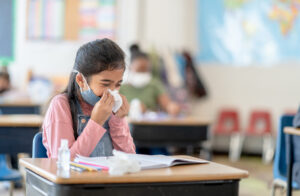Elite Law School Called Out By Students Over Draconian Policy
This doesn't seem like an outrageous demand.
 There’s a natural push and pull between students and the administration of a law school. Each group has different goals and needs, and the most successful institutions balance those competing interests. But, according to a student petition at the University of Chicago Law, the administration there is striking a terrible balance.
There’s a natural push and pull between students and the administration of a law school. Each group has different goals and needs, and the most successful institutions balance those competing interests. But, according to a student petition at the University of Chicago Law, the administration there is striking a terrible balance.
This year, the law school announced a new policy regarding the recordings of classes. Students can only get recordings in the following circumstances: (1) observance of religious holidays, (2) approved disability accommodations, (3) approved Title IX accommodations, and (4) when two make-up classes are scheduled at the same time.
The open letter — signed by over 100 students — seeks to change that policy. They’d like some additional exceptions to the law school’s rather strict policy. The signatories are specifically seeking access to recorded classes (1) during medical emergencies and illnesses, (2) during extraordinary personal or family circumstances, and (3) when students are taking mandatory professional examinations.

Luxury, Lies, And A $10 Million Embezzlement
That seems… entirely reasonable. Listen, I am incredibly sympathetic to institutions trying to prioritize the intangible benefits of in-person education/work/life in general. But this strikes me as a bridge too far. After all, the ubiquity of recorded classes became a reality because of the COVID pandemic. Now at UChicago Law someone who has COVID cannot access the recordings of the classes they miss because of the disease. Which, in turn, encourages high achieving students (which they have plenty of at UChicago) to go to school sick and spread the illness. From the petition:
Already this year, students have been denied access to class recordings after contracting COVID-19 or other illnesses, and one student was denied recordings after missing a week of class due to emergency surgery. Failing to provide recordings for medical illness unfairly penalizes students for missing classes due to circumstances beyond their control, and places undue stress on students when their focus should be on recovery. This policy also puts the larger Law School community at risk by incentivizing students to come to campus while sick and spreading their illness to others. Students should not be forced to choose between keeping themselves and the Law School community safe, or keeping their grades up.
This feels very through the looking glass. If law schools didn’t understand the benefits of limiting COVID exposures there wouldn’t be classroom recordings. This should be a no-brainer. Honestly, so are the other exceptions students are seeking. Why shouldn’t someone dealing with a family emergency or taking the MPRE be able to listen to a class recording? It doesn’t diminish the quality of a law school’s legal education to show the bare minimum of compassion for their students. Something the petition notes many of UChicago Law’s peer school do.
The Law School has insisted on maintaining a strict recording policy, despite the fact that its peer institutions have rejected such an unforgiving, regressive approach. Harvard Law School explicitly allows access to class recordings for all of the reasons stated in this letter: severe illness and medical emergencies, personal emergencies, and professional examinations. Columbia Law School directs instructors to support sick students, including by providing access to recordings. UC Berkeley School of Law allows class recordings to be created “[d]uring emergencies and disasters.” Northwestern Pritzker School of Law tells students to listen to course recordings if they “miss class for a legitimate reason.” And several other law schools (including Yale Law School, Stanford Law School, and Duke School of Law) permit professors to record classes when requested by students.
Sponsored

Luxury, Lies, And A $10 Million Embezzlement

Thomson Reuters' Claims Explorer: A Powerful Tool For Legal Claim Identification


Curbing Client And Talent Loss With Productivity Tech

Thomson Reuters' Claims Explorer: A Powerful Tool For Legal Claim Identification

This seems like a pretty easy way to support students. It’s hard to understand why the law school is dragging its heels. Above the Law reached out to UChicago Law for comment, but they did not immediately provide one.
 Kathryn Rubino is a Senior Editor at Above the Law, host of The Jabot podcast, and co-host of Thinking Like A Lawyer. AtL tipsters are the best, so please connect with her. Feel free to email her with any tips, questions, or comments and follow her on Twitter @Kathryn1 or Mastodon @[email protected].
Kathryn Rubino is a Senior Editor at Above the Law, host of The Jabot podcast, and co-host of Thinking Like A Lawyer. AtL tipsters are the best, so please connect with her. Feel free to email her with any tips, questions, or comments and follow her on Twitter @Kathryn1 or Mastodon @[email protected].
Sponsored
Law Firm Business Development Is More Than Relationship Building








